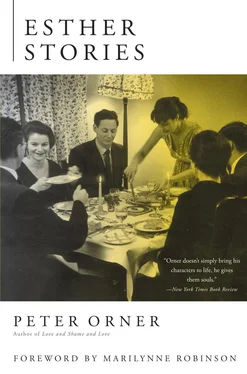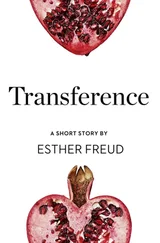“I don’t feel the kicking anymore.”
“You’re just getting nervous because it’s close to the time.”
“Lloyd.”
“It’s not unusual for the movement to lessen toward term. Many studies have shown—”
“No shifting. Nothing. A week ago it was kicking and now—”
“It’s normal. Don’t get upset. I’m telling you.”
“No. I don’t feel any kicking.”
Because he refused to stop loving her. Not because she was jealous. Not about who he was screwing in the linen closets at the hospital. I watch Lloyd watch the spot at Pritzger’s where they took Esther’s casket away. With all the people who knew her chatting quietly, respectfully…After the baby died. Because he assaulted her with his optimism and his willful infuriating blindness. This I don’t need anyone to tell me across the kitchen table over coffee. That screaming, that jabbing. Because Lloyd couldn’t see that the death of her baby was punishment for giving in so easily.
It’s what he could never understand. He thought she’d settle into her life because that’s what people did. He bumps shoulders with his new pretty doctor wife, but doesn’t feel her. He hears his wife conversing with the little French woman. Their words mean nothing. Twelve years since he last saw Esther, but the wall that time built has always been hollow.
They released her after ten months. (My grandmother had been telling anyone outside her closest circle that Esther was traveling abroad.) The divorce decree gave her next to nothing because of the evidence of physical abuse. She had nowhere else to go, so my grandparents gave her Olivia’s old basement room, the room Olivia had slept in during the four years she lived in the new house before she retired and moved home to the city to live with her sister full time. My grandfather got Esther a job at a credit bureau in Wheeling — she’d always been strong with numbers. At my grandfather’s urging she’d been an accounting major at Illinois (although she never got a degree). Everyone was grateful that numbers seemed to come back quickly for her. After six months at home, she even bought a car. She was thirty-nine when she moved back in with my grandparents. She told my grandmother she was going to move out soon, but she never did. By all accounts she got along well at work. Her employer — a thick-necked man who kept honking into a napkin — spoke lovingly of her at the funeral: She was the one everyone in the office went to. You see? Esther understood things, outside-of-work things. She made a few friends and used to go out for drinks with them at the Wooden Nickel in Highwood. At home, she was silent most of the time. While my grandparents no longer hosted parties, they often went to them. On some weeknights Esther ate dinner with my grandparents, but most nights she ate alone downstairs. Soups out of a cup heated in the microwave. Simple salads. Noodles. She never appeared on holidays. After the money toss on the boat she refused outright to go to my father’s house, and would not come up from the basement if he was present, so I rarely saw her during those years. I do know that she read considerably during the last eight years of her life. I often noticed gaps on my grandfather’s shelf of Harvard Classics. Writers like Hugo and Dostoevsky were often missing, but also the other names — the ones I’d never heard of — were gone too: Valera, Björnson, Daudet, Kielland, Musset.
I remember she came into my grandfather’s study once while my brother and I were over. My father wasn’t around. She sat silent. I watched her scan my grandfather’s bookshelf as we sat and talked, and my grandfather laughed, leaned back in his swivel chair and told us his own most famous story. I was too old for the war, you understand? But that wasn’t going to stop me, no sir. Signed up for the local Coast Guard out of a sense of duty, a man has to have a sense of duty. And so they sent me out to search for Hitler’s submarines in the Calumet River on the southwest side! This was the part of the story when, on cue, my brother and I had always laughed when we were younger. We did that day, too. My grandfather pointed at us and shouted: But no, boys! I didn’t laugh! I went — patriot that I was and am — and scoured every inch of that river for sauerkraut. Ha! Did such a good job they sent me to the South Pacific. I watched her not listening, never listening — how many times had she heard all this? — looking over the books. She was plumper and shorter, it seemed, almost squat, but her face was still the face of Esther Burman from the high school photographs. The high-arched eyebrows, small mouth, tightly pulled-back hair. She was wearing new white running shoes. Suddenly she stood. She waited until we all stopped talking and looked at her. Then she left the room without a wave or a nod.
And some weeknights during those years, my grandfather would shut himself in his study with his Scotch and the Tonight Show and Esther would blame my grandmother for everything. Slam the microwave door and say, Look what you created. And my grandmother would sit at the glass table in the kitchen (out the window, in the dark, my grandfather’s little tomato garden) and whisper, I only wanted the best for you. Only the best, but even your father (and what does he ever notice?) knew that Lloyd was a nothing and I should have known, too. It’s not Lloyd, Mother. It’s never been Lloyd. What’s it going to take for you to understand? But running off with a nurse like that. It’s enough to make you retch. That you insisted. It’s not what you insisted on that ruined me. I never forced. You make it sound like I had a gun to your head. I didn’t say force. Christ, if you forced I might have known better than to listen to any of it. Any of it! And then, this is what my grandmother told me, Esther would know that was wrong, that they were both wrong about everything, and she would start to shriek. Then the shriek would turn into a gagging laugh that sounded like choking, and in his room my grandfather would stand and turn up the volume on Johnny Carson.
Esther’s grave lies next to her daughter’s. The gray markers are flush to the grass, modest, but solid. The man in the cemetery office tells me that they are made of pressure-tested granite from Barre, Vermont. “It’s a perpetual stone,” he says.
With my index finger I smooth away the dirt from the valleys in letters.
Beloved Daughter and Mother
And yes I want to say something. I hadn’t known that I would, but I do now. That one way of looking at you, and what I know of you is that so much of your life was a begging off and a begging off until — that was the cruelty. That when you finally dared, you lost.
“So Esther knew before it happened?”
“Not for certain. How could she have known for certain? I suppose she couldn’t have. But yes, a month before, she called me — not crying — and said, ‘Mother, Lloyd says everything is fine, that they often stop moving, but I know. A mother knows.’ She was right.”
Esther Burman died of breast cancer on October 27, 1988. It was fast and deadly, and my grandmother drove her to the hospital every other day for treatment and finally, to stay for good, and Esther screamed and swore at her because she didn’t want to die in spite of what most people thought. A cruelty of the cancer was that she was so drugged she couldn’t read novels. My grandmother sat in the silence as her daughter stared at the turned-off television. Another hospital, this one a normal one — one she could tell people at the club about — but so much worse.
Like my father, I never went to see her in that last hospital, either.
I stand in front of Olivia and her sister’s house on West Van Buren. Late October 1989. Most of the leaves have fallen to the little brown lawn in front of the house, a low bungalow squeezed between two squat brick apartment buildings. A couple of boys on bicycles chase each other down the street. Olivia shouts from the screen door. Her sister Mag hovers behind her with a plate heaped with brownies and cookies and chocolates. I hug Olivia hard; she is still strong and feels — like she always did — pillowy and starchy. Her white hair pulled back tight and there is far less of it. A hollowing, some sinking below her eyes, makes me want nothing more than to curl up with her and just lie there. She’s laughing. Her sister’s laughing. Leooooooo. Olivia yanks me into the house and pushes me into a puffy chair and sits down so close our knees and feet touch. The living room is crowded with chairs; the coffee table has been taken over by framed photographs. So many relatives, aunts, uncles, cousins, and I never knew a single one. The blinds are half drawn. Thin lines of dusty afternoon light crisscross the room.
Читать дальше












